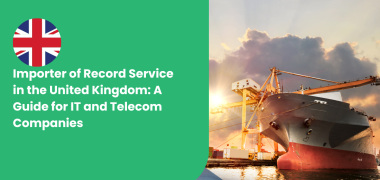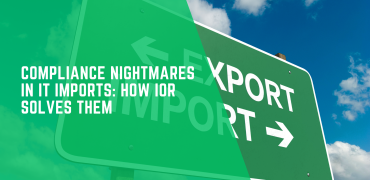In the highly regulated landscape of international trade, IT and telecom companies face unique challenges when importing goods into the United Kingdom. The complexities of customs compliance, product standards, and regulatory requirements necessitate a thorough understanding of the Importer of Record (IOR) service. This guide aims to provide IT and telecom companies with a comprehensive understanding of the IOR service in the UK, highlighting its importance, legal framework, benefits, challenges, and best practices for successful implementation.
Understanding the Importer of Record (IOR) Service
Definition and Role
An Importer of Record (IOR) is a legal entity responsible for ensuring that imported goods comply with all local laws and regulations. This entity takes on the official responsibilities of the importer, which includes managing customs documentation, paying duties and taxes, and ensuring compliance with all applicable regulations. For IT and telecom companies, the IOR service is crucial for navigating the intricate regulatory landscape associated with importing electronic equipment and technology products.
Key Responsibilities
- Customs Compliance: Ensuring that all imported goods meet the necessary legal and regulatory requirements.
- Documentation: Handling all required paperwork, including import licenses, permits, and certificates.
- Taxes and Duties: Calculating and paying all applicable taxes, duties, and fees.
- Logistics Coordination: Managing the logistics and transportation of goods from the port of entry to the final destination.
- Record Keeping: Maintaining accurate records of all transactions and compliance-related documents.
Legal Framework in the UK
Regulatory Bodies
In the UK, several regulatory bodies oversee the importation of goods, including IT and telecom equipment. Key agencies include HM Revenue and Customs (HMRC), the Office of Communications (Ofcom), and the Department for International Trade (DIT). These bodies enforce compliance with customs laws, trade regulations, and industry-specific standards.
Compliance Requirements
To operate as an Importer of Record in the UK, businesses must adhere to a stringent set of compliance requirements:
- Customs Declarations: Submitting accurate customs declarations for all imported goods.
- VAT and Duty Payments: Ensuring the timely payment of Value Added Tax (VAT) and customs duties.
- Product Standards: Complying with UK and EU standards for product safety, electromagnetic compatibility, and environmental regulations.
- Trade Controls: Adhering to trade control regulations, including sanctions and export controls.
Penalties for Non-Compliance
Failure to comply with UK import regulations can result in severe penalties, including fines, seizure of goods, and legal action. It is crucial for IT and telecom companies to understand and adhere to all relevant laws to avoid these consequences.
Benefits of Using an Importer of Record Service
Simplified Import Process
One of the primary benefits of using an IOR service is the simplification of the import process. By outsourcing the responsibilities of customs compliance, documentation, and tax payments to an experienced IOR provider, IT and telecom companies can focus on their core operations and innovation.
Risk Mitigation
IOR services help mitigate risks associated with importation. Experienced IOR providers have a deep understanding of local regulations and can navigate complex compliance requirements, reducing the likelihood of errors, delays, and penalties.
Cost Efficiency
Using an IOR service can be cost-effective in the long run. By ensuring compliance and avoiding fines, businesses can save money. Additionally, IOR providers often have established relationships with customs authorities and logistics partners, which can lead to cost savings through efficient processes and economies of scale.
Expertise and Knowledge
IOR providers bring valuable expertise and knowledge to the table. They stay updated on regulatory changes and industry best practices, ensuring that businesses remain compliant and competitive in the global market.
Challenges in Implementing IOR Services
Complexity of Regulations
One of the main challenges in implementing IOR services is the complexity of regulations. The UK has a comprehensive and ever-evolving set of laws governing importation. Staying compliant requires continuous monitoring and adaptation to regulatory changes.
Cost Considerations
While IOR services offer cost efficiencies, they also come with upfront costs. IT and telecom companies must evaluate the financial implications of outsourcing these services and determine whether the benefits outweigh the expenses.
Trust and Reliability
Selecting a reliable IOR provider is crucial. Businesses must conduct thorough due diligence to ensure that the provider has a proven track record, expertise in the relevant industry, and a solid reputation for reliability and compliance.
Coordination and Communication
Effective coordination and communication between the business, the IOR provider, and other stakeholders are essential for a smooth import process. Miscommunication or lack of coordination can lead to delays and compliance issues.
Best Practices for Utilizing IOR Services
Conducting Due Diligence
Before selecting an IOR provider, IT and telecom companies should conduct comprehensive due diligence. This involves:
- Researching Providers: Investigating potential IOR providers to assess their experience, expertise, and reputation in the industry.
- Checking References: Speaking with current or former clients of the provider to gauge their satisfaction and reliability.
- Evaluating Capabilities: Ensuring that the provider has the necessary resources and knowledge to handle the specific requirements of the IT and telecom sector.
Establishing Clear Contracts
Clear and detailed contracts are essential for defining the scope of services, responsibilities, and expectations. Key elements to include in the contract are:
- Service Scope: Outlining the specific services the IOR provider will offer, including customs compliance, documentation, and logistics management.
- Compliance Assurance: Defining the provider’s responsibilities for ensuring compliance with all relevant regulations.
- Liability and Risk Management: Specifying the liability of the IOR provider in case of non-compliance or errors, and outlining risk management strategies.
- Communication Protocols: Establishing clear communication channels and protocols to ensure effective coordination between all parties.
Regular Compliance Audits
Regular compliance audits are crucial for ensuring ongoing adherence to regulations. IT and telecom companies should:
- Schedule Periodic Audits: Conduct regular audits to review compliance procedures and identify any areas for improvement.
- Work with the IOR Provider: Collaborate with the IOR provider to address any compliance issues and implement corrective actions.
- Stay Updated on Regulations: Keep abreast of changes in regulations and ensure that both the company and the IOR provider remain compliant.
Leveraging Technology
Technology can play a significant role in enhancing the efficiency and accuracy of the import process. IT and telecom companies should:
- Implement Compliance Software: Utilize software solutions that automate compliance checks, documentation, and reporting.
- Use Tracking Systems: Employ tracking systems to monitor the movement of goods and ensure timely delivery.
- Integrate with IOR Systems: Ensure seamless integration between the company’s systems and the IOR provider’s systems to facilitate efficient data exchange and communication.
Conclusion
For IT and telecom companies, navigating the complexities of importing goods into the UK can be daunting. The Importer of Record (IOR) service provides a valuable solution by simplifying the import process, ensuring compliance, and mitigating risks. By understanding the legal framework, benefits, challenges, and best practices associated with IOR services, IT and telecom companies can make informed decisions and leverage these services to enhance their international trade operations. With the right IOR provider, businesses can focus on innovation and growth, confident in their compliance with UK import regulations.




